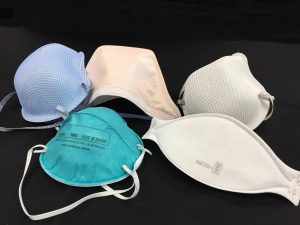NIOSH and FDA Collaboration Streamlines Regulatory Oversight for N95 Filtering Facepiece Respirators
Posted on by
Previously, N95 filtering facepiece respirators (N95) used in healthcare needed approval from both the National Institute for Occupational Safety and Health (NIOSH) and the Food and Drug Administration (FDA).* On May 17, 2018, FDA published a final order in the Federal Register to exempt a subset of N95s intended for use in healthcare from premarket notification requirements subject to conditions and limitations. This exemption will decrease the regulatory burden on some respirator manufacturers, and will eliminate private costs, and expenditures required to comply with certain federal regulations.
Upon publication of the final order, NIOSH and FDA entered into a Memorandum of Understanding (MOU) that provides a framework for efficient and coordinated regulatory oversight between FDA and NIOSH and outlines the agencies’ mutually agreed upon review process. As of July 2, 2018, NIOSH will begin accepting applications to implement this process for those manufacturers intending to submit N95 filtering facepiece respirators for use in healthcare. Consistent with current practices, respirators reviewed under this process are intended to be used in accordance with Occupational Safety and Health Administration (OSHA) respiratory protection standard requirements.
This FDA action affects the NIOSH approval process and related activities for NIOSH-approved N95 respirators intended for use in healthcare.
- Redundant actions between the two agencies will be eliminated.
- Manufacturers will only have to submit an application to one agency (NIOSH), rather than two (NIOSH and FDA).
- NIOSH will continue to ensure these devices provide the expected performance levels, and are safe for their intended use.
- NIOSH will now evaluate the manufacturer’s test data for biocompatibility, flammability, and fluid resistance for conformity to relevant standards during its approval process, tasks previously performed by the FDA.
- The conformity assessment process will include post-market audits that will involve conducting required tests, including flammability and fluid resistance. NIOSH will conduct those tests for a sample of products in accordance with the appropriate federal and consensus standards to ensure the products continue to conform to the approved conditions.

Under the MOU, the FDA and NIOSH will continue to monitor the conformity assessment approach to determine if any changes are needed to best align with the PPE Conformity Assessment Framework and continue to streamline and harmonize each agency’s processes where overlapping responsibilities exist.
NIOSH has published related research on respirator filtration on the NIOSH Science Blog and fluid resistance in the American Journal of Infection Control. NIOSH is responsible for approval of N95s intended for occupational use. The authority is granted to NIOSH in accordance with standards established in 42 CFR Part 84. NIOSH also addresses quality assurance requirements for the manufacturing of respiratory protective equipment. For more information on the NIOSH respirator program visit the website.
Once the changes have been implemented, we welcome your input to further streamline the process.
Jeffrey Peterson, MS, is the Branch Chief of the Conformity Verification and Standards Development Branch in the NIOSH National Personal Protective Technology Laboratory.
Judi Coyne, MBA, MA, is a Health Communication Specialist in the NIOSH National Personal Protective Technology Laboratory.
Maryann M. D’Alessandro, PhD, is the Director of the NIOSH National Personal Protective Technology Laboratory.
*Approvals with antimicrobial coatings and approvals specifying disease claims will continue to require FDA clearance.
Posted on by

